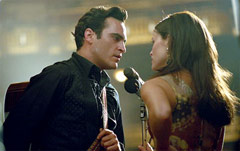
| HOME |
| NERVE |
| REVIEWS |
| ARCHIVE |
| EVENTS |
| LINKS |
| ABOUT US |
| CONTRIBUTORS |
| BACK ISSUES |
| CONTACT US |
 Walk
The Line (12A)
Walk
The Line (12A)
Directed by James Mangold
Written by Gill Dennis and James Mangold
Screening at FACT and Switch Island Leisure Park from 3rd February 2006
Reviewed by Adam Ford
Much of the advance publicity for this Johnny Cash biopic has been giddy TV interviews, with presenters falling over each other to praise the resemblance that the voices of Joaquin Phoenix and Reese Witherspoon bear to those of Johnny Cash and his wife June Carter. It’s true - Phoenix particularly deserves plaudits for capturing Cash’s rich baritone and mannerisms. But how much does a great impression really tell us about a person? Not enough, on this evidence. Writer and director James Mangold has turned Johnny Cash the character into 'Johnny Cash' the caricature.
We first find young 'JR' (Ridge Canipe) living with his parents and older brother Jack in 1940s Arkansas. When Jack died in a farming accident, Johnny blamed himself, and his father (Robert Patrick) was less than sympathetic. Several years later, Johnny (now played by Phoenix) left to join the US Air Force in Germany - an experience he found pointless and frustrating. On returning to America he married Vivian (Ginnifer Goodwin), had children with her and auditioned to get a recording contract. Legendary producer Sam Phillips - having already signed Elvis (Tyler Hilton) - was less than enthused by Cash's gospel number. But then Johnny tried one he wrote in Germany and was signed up like a shot.
From there Cash went on to tour with most of the big names from the early days of rock 'n' roll - Elvis, Jerry Lee Lewis (Waylon Payne) and - of course - June Carter (Witherspoon). But they both had families back home and it took many years for them to get together, during which time Cash filled the gaping holes in his life with amphetamines.
But lots of people have had bad relationships with their parents, complicated romantic lives and drug addictions. Johnny Cash was nothing special in that sense. What set him apart was the fact that he stood up against war and injustice at a time when that was deeply unfashionable within music. As such, he inspired later generations of musicians, many of whom he met before his death in 2003. Apart from one memorable scene with a glass of water before Cash's famous gig at Folsom Prison, all of this is ignored by writer/director Mangold, who seems to have put commercial considerations before the chance to make a classic film. Regrettably, he has made Walk The Line little more than another Hollywood love story, albeit an excellent one.
Printer friendly page